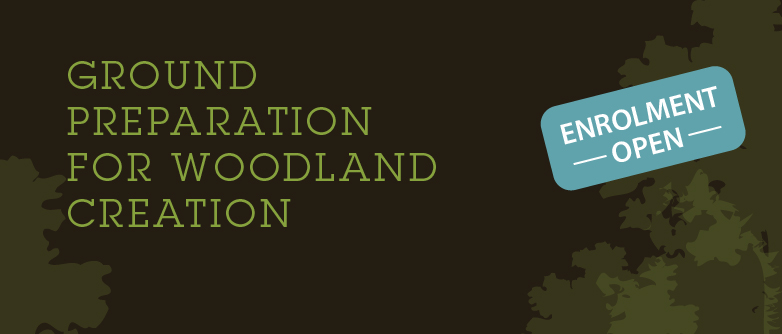About This Course
Welcome to our comprehensive online course on Ground Preparation for Woodland Creation.
The course is comprised of modules and previously recorded online tutorials covering:
- What is ground preparation?
- Site conditions and tree growth
- Environmental guidance and legislation
- Ground preparation techniques
- Matching ground preparation to the site
- Case study reflections
At the end of the course you will recieve a certificate of completion.
Cost and Enrolment
This course is available for £50 and will start on the 19th January 2026 and end on the 27th February 2026. Payment is made through TryBooking following the link below:
Once payment has been made, we will enrol you on the course and you will be able to access the course content on the start date. Please also register with Canopy Learning separately.
Requirements
This course is relevant to anyone involved or interested in tree planting across the UK. This includes contractors, contract managers, land owners, specifiers, regulators, or anyone simply interested in the how and why ground preparation for woodland creation takes place.
Acknowledgements
This training course is developed and provided by Cumbria Woodlands. It has been funded by the Forestry Commission in association with Roots to Prosperity, RDI and Martin Glynn. The initial support for this work came from the Forestry Commission through the Research and Development Grant under the Forestry Innovation Fund.
Course Authors
Carrie Hedges
Carrie is a forestry consultant specialising in providing land owner advice, developing research, and authoring training materials in woodland creation and management, and related environmental subjects such as carbon. She is a PhD Researcher looking at the habitat preferences and influence of climate on montane scrub trees in the UK. Previously, Carrie worked for Forest and Land Scotland (Galloway), then in several roles at the University of Cumbria including teaching conservation strategies and ecology, various research and development roles in outdoor learning and nature connection, and interdisciplinary land management and policy as the Development Officer at the Centre for National Parks and Protected Areas.
Chris Watson
Chris is the Woodland Resilience Advisor for Forestry Commission England and has 20 years of experience working in forest and woodland management across Northern England. Previous to his current role Chris taught forestry for four years at the National School of Forestry, University of Cumbria, where he specialised in operational forestry practice, forest policy and GIS.
Course Tutor
Dave Atkinson
Dave Atkinson is the Senior Forestry Manager for Edwin Thompson who operate across the North of England and South Scotland. Dave has over 30 years of experience in the sector starting his career in private forestry in the West Highlands, working as a woodland officer for the Forestry Commission in Cumbria, followed by six years lecturing in forestry for the University of Cumbria, before returning to the front line with Edwin Thompson in 2013. Edwin Thompson manage a significant portfolio of farms, estates and woodlands on behalf of private clients and have planted between 50 and 200 hectares of new woodland most years.
“My role in the course will be to provide practical insight as part of the tutorials and consider how guidance, regulation and site planning are taken forward out there on the ground. We, as foresters, are often guilty of making forestry complicated, when in reality it is one of the simplest forms of land management. Anyone who has ever tried to grow anything in their back garden will be well on their way to understanding forestry ground preparation. Weed free, warm, well drained and aerated soils grow the best veg and so it is with trees.” (Dave Atkinson)

